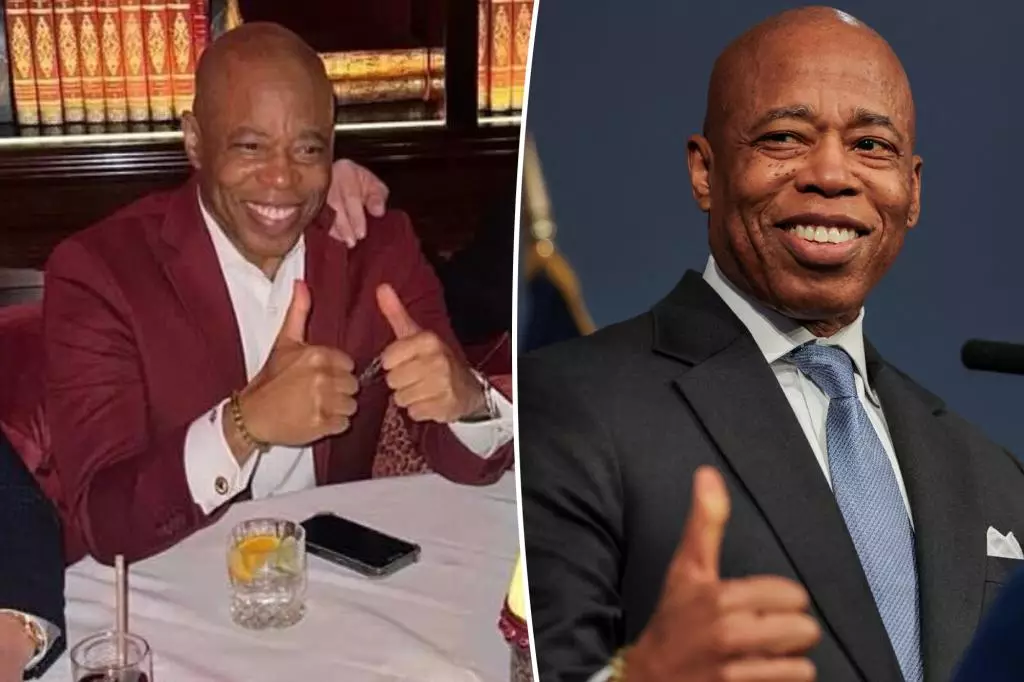New York City Mayor Eric Adams has found himself in a precarious position, transitioning from the scrutiny of legal troubles to the vibrant social scene of the Big Apple. Recently, the Department of Justice’s decision to drop corruption charges against him has allowed the mayor to re-enter the social spotlight. Spotted dining at upscale venues like Chez Margaux with high-profile individuals—including philanthropist Alisa Roever—Adams is attempting to redefine his public image amidst ongoing controversies.
This shift marks a significant pivot for Adams, who had been under intense scrutiny for alleged corruption involving his administration. The dropping of charges, however, does not mark a clean slate. In fact, it has sparked a myriad of conversations about the ethical implications of his relationships with influential figures in New York. Roever herself has previously attracted media attention due to her close ties with Adams and even participated in a high-profile event alongside Trump’s security team, inviting critiques about ethical boundaries in political conduct.
The Allure of NYC’s Elite Scenes
Adams’ choice to frequent exclusive clubs such as Zero Bond and Casa Cipriani casts a spotlight on the intersection of politics and celebrity culture in New York. His recent appearance at Chez Margaux, a luxury supper club, positions him among a roster of stars including Taylor Swift and Gigi Hadid, revealing how club culture serves not just as entertainment, but as an extension of Adams’ political networking. This restaurant has quickly made a name for itself, drawing in celebrities and elite clientele since its opening, creating a unique hub for wealth, influence, and nightlife.
The engagement of public figures within these social circles often ignites discussions regarding transparency in governance and accountability. The mayor’s interactions in such arenas prompt questions about whether civic duty conflicts with personal interests, particularly when it involves individuals who wield considerable social capital, like Roever. Critics argue that participation in New York’s elite nightlife could further besmirch Adams’ administration, especially in light of his recent legal battles.
Future Directions and Political Landscape
As Adams navigates tumultuous waters, his plan to reopen the US Immigration and Customs Enforcement (ICE) office at Rikers Island adds another layer of complexity to his political landscape. This decision may reflect a strategic maneuver to repair ties with federal authorities while addressing local concerns surrounding immigration and public safety. However, it could also be interpreted as a means of appeasing Trump-affiliated constituents, prompting speculation about Adams’ political alliances as he prepares for a potential re-election campaign.
Moreover, the ongoing lawsuit to reclaim over $80 million in federal funding raises questions about his approach to city governance amid strained relations with the federal government. Despite challenges from Governor Kathy Hochul regarding his leadership, Adams remains resolute in his intention to pursue a second term, suggesting a belief in his capability to manage both his political responsibilities and personal engagements effectively.
In summation, Eric Adams’ journey as mayor is one of contrasts—balancing the demands of a high-stakes political environment while navigating the alluring, yet potentially perilous, waters of New York’s elite social scene. His future actions will undoubtedly shape both his legacy and the broader implications for governance in the dynamic landscape of the Big Apple.
